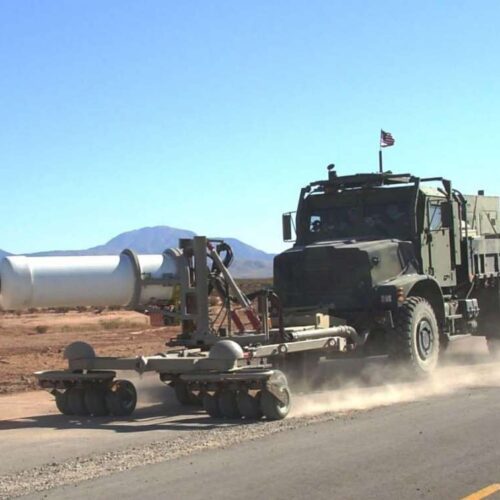Introduction
After receiving more than $50 million in government contracts, a company that once promised to revolutionize warfare with a weapon that shoots lightning bolts is seeing its hopes for further federal funds vaporized.
The U.S. Marine Corps recently ended a contract with Applied Energetics, a Tucson-based firm that has been working for years on directed energy weapons for the military, iWatch News has learned. The company’s efforts were detailed earlier this year in a Center piece on the Pentagon’s troubled unit designed to fight roadside bombs, the Joint Improvised Explosive Device Defeat Organization, or JIEDDO.
The terminated Marine contract was for an Applied Energetics weapon designed to zap roadside bombs with bolts of lightning guided by ultra-short pulsed lasers; the company’s work on the weapon and similar systems had attracted $54 million in federal funds since 2005.
The latest contract was terminated “for convenience of the government due to the material solution not adequately meeting the requirement,” wrote Jim Katzaman, a spokesman for Marine Corps Systems.
On a conference call with investors Tuesday, however, the company said only that it had completed work under the Marine Corps contract earlier this year.
At the heart of Applied Energetics’ technology is an old idea: using a Tesla Coil-like device to shoot artificially created lightning. Such technology could, in theory, be used to pre-detonate improvised explosive devices, or IEDs, the roadside bombs that remain the leading killer of U.S. troops in Afghanistan.
Over the years, however, Applied Energetics has for critics become a poster child for failed efforts that relied on technological solutions to defeat the bombs.
Formerly known as Ionatron, the company was founded in 2002 during the early days of the war on terror, when it marketed its technology as a Star Trek-style phaser that could shoot bolts of lightning at potential enemies. It received early funding from In-Q-Tel, the CIA’s venture capital arm, and caught the attention of senior Pentagon officials, including then-Deputy Defense Secretary Paul Wolfowitz.
The company later changed its name to Applied Energetics, and switched its focus to a technology that could counter roadside bombs. In its new incarnation, the weapon was placed on a vehicle, which would then fire bolts of lightning at IEDs.
But the technology had a mixed record, at best.
A 2007 report in The Washington Post described the sometimes comical attempts to test and field the company’s Joint IED Neutralizer, known as JIN. That same year, JIEDDO ended the JIN contract “for a failure of the system to meet desired performance criteria,” wrote Irene Smith, a JIEDDO spokeswoman, in response to questions.
Despite those failures, the company continued to receive noncompetitive Pentagon funding, thanks in large part to congressional support, incuding a $400,000 earmark from Republican Sen. Thad Cochran (R-Miss.) According to JIEDDO, Congress in 2007 told the Marine Corps to take a new look at the technology; the Marine Corps tested the system, this time on mine rollers — World War II-era devices attached to the front of vehicles to explode pressure-detonated mines and bombs. The combination of the JIN and the roller was dubbed a JOLLER.
According to figures provided by JIEDDO, $24 million of the office’s money was spent on the JIN system, and then another approximately $30 million on development and testing of the Joller. In 2010, JIEDDO handed the project over to the Marine Corps.
Applied Energetics announced last year it was receiving a $10.4 million contract from the Marine Corps for “operational support” to deploy the weapon on Marine Corps and Army vehicles, but released few other details. “Due to the sensitivity of the effort, the Customer has requested that no additional details regarding this contract be publicly disclosed,” the company stated.
The company, for its part, denies the Marine Corps’ characterization of the contract cancellation. “The Marine Corps did not Terminate for Convenience,” Kevin McGrath, a spokesman for the company, wrote in an email. “A Termination for Convenience comes before a contract is complete or fulfilled, which did not occur.”
McGrath did not address the Marine Corps’ statement about the technology not fitting the military’s requirement, or why the information was not discussed in this week’s conference call.
The Marine Corps says that the term “cancellation for convenience” is simply a way to describe what happened: it had prepared a new $3 million contract for Applied Energetics on a sole-source basis. “On the day the contract was ready for approval and signature, the commander in the field cancelled the requirement,” wrote Katzaman, the Marine Corps spokesman.
The Marine Corps ended up paying $187,000 to the company to cover cancellation costs.
The Marine Corps’ rejection of the technology follows a series of missteps for the company, which, despite government support and private investment, has faced mounting losses and legal problems in recent years. In 2007, family members of the former CEO settled with the Securities and Exchange Commission charges of insider trading related to the company. In 2009, the company paid out over $5 million to settle a class action lawsuit brought by investors claiming the lightning gun maker misled shareholders by not revealing problems with its weapon.
The company acknowledged declining revenues in its Tuesday conference call with investors, as well as a 22 percent reduction in its workforce in July, but made no mention of problems with its Marine Corps contract. Joseph Hayden, president of Applied Energetics, said that the company was still waiting to hear from the military about its evaluation and need for the counter-IED system.
“Those folks have a lot on their hands with the drawdown,” he said.
Read more in National Security
National Security
Congressional reform and interoperability still plagued by systematic problems
Bipartisan Policy Center report says some post-9/11 recommendations haven’t been implemented

Join the conversation
Show Comments